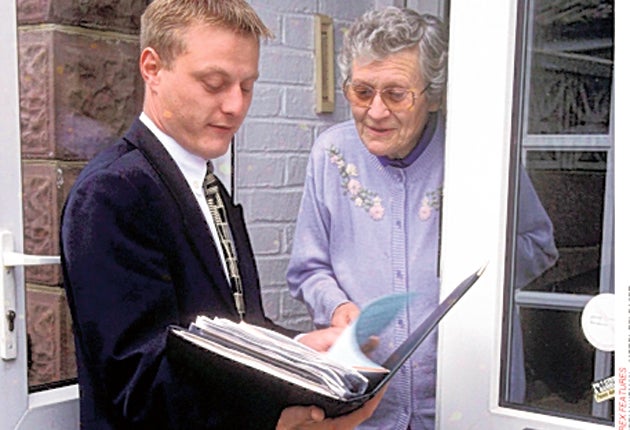Door-to-door sales need regulation, says Simon Read

Dodgy doorstep sellers were issued a legal warning this week. Surrey Trading Standards prosecuted energy giant Scottish and Southern Energy for misleading selling practices. One of the company's salespeople had knocked on doors with a sheet of paper which, he claimed, showed that people were over-paying on their energy with a rival supplier. In fact the print-out showed no such thing.
"The seller didn't actually have a clue but the sales script was cleverly designed to put potential customers on the back foot and to open the door to a sale," explains Steve Playle, the Surrey County Council Trading Standards officer who led the investigation. "Energy supply by the big six firms is obviously highly competitive but it is a complex market with hundreds of different tariffs that make meaningful price comparisons quite difficult."
Unscrupulous salespeople often rely on bamboozling people with bogus facts and figures to scare them into signing up for what could well be a bad deal. Talking to people on their own doorstep often catches them unawares and particularly forceful salesfolk can badger people into buying something without them really realising.
The energy industry has been notorious for dubious sales ever since deregulation meant suppliers could compete against each other across the country.
"Misleading doorstep energy sales have been a nightmare for consumers for years, leaving many switching to a worse energy deal," says Audrey Gallacher, head of energy at Consumer Focus. "This verdict has revealed a deliberate tactic by SSE, not the behaviour of a rogue salesperson. It should make all energy companies look long and hard at how they sell on the doorstep."
The sentencing of the verdict in the Guildford court will take place on 27 May and is likely to see SSE fined, according to Consumer Focus. Hopefully it will be a significant amount, enough to send a warning to the rest of the energy industry and others that use dubious doorstep tactics.
"The verdict sends a clear message that they must clean up their act on sales scripts and revise their pay and incentives system for salespeople to make sure customers can rely on an honest and fair service on the doorstep," says Gallacher.
I'd like the government to go further and ban doorstep selling of costly financial arrangements. Until that happens we must all be wary of that knock on the door.
Group buying schemes are appearing daily but their offers are looking less than attractive. The idea behind the schemes is simple: they negotiate discounts with different companies and suppliers in return for delivering 100s of customers. All you do is sign up for the schemes and start receiving daily emails containing offers.
That all sounds good until you discover that your email inbox is full of deals that actually aren't all that good. They quickly get annoying. So I was interested in an Advertising Standards Authority adjudication this week on one of the giants of the group buying industry, Groupon.
The global firm published internet ads offering unlikely offers. One stated "All you can eat in London for £3" while another featured "XXL – Bouquet of Flowers in London" and showed a bouquet of roses with a price tag of "from £8".
The ASA said the ads were misleading as such offers weren't available and Groupon has now withdrawn them.
We all like a bargain but I suspect many of the group buying schemes are simply selling "discounts" on products and services that may otherwise be hard to flog. I'd be interested to hear your experiences.
Subscribe to Independent Premium to bookmark this article
Want to bookmark your favourite articles and stories to read or reference later? Start your Independent Premium subscription today.

Join our commenting forum
Join thought-provoking conversations, follow other Independent readers and see their replies